In July of 1977, my wife and I took a break from moving into a new house in Houston and made our way to the local movie theater. It was the opening day for Star Wars, and we went to the early afternoon showing. Except for us, the theater was almost empty. We loved the movie. When we left the theater, we discovered where all the people were—the line was more than two blocks long.
It was our introduction to the Star Wars franchise, now more than 40 years old. We ended up skipping the three prequels, but we returned for the three with Princess Leia and Luke Skywalker, including the most recent release, The Last Jedi.
We saw the George Lucas (and later Disney) productions. We didn’t know about the Shakespeare versions. I wonder how the Globe Theatre would have managed the battle fleets and the Death Star back in the early 1600s. And the light sabers.
You didn’t know about the Shakespeare versions?
Try this. And read it aloud.
The Prologue to The Empire Striketh Back
(chanted or sung by the chorus)

For though they have the Death Star all destroy’d,
Imperi’l troops did from the ashes climb
And push the rebels closer to the void.
Across the galaxy pursu’d with speed.
The rebels flee th’Imperi’l Starfleet vast.
A group with Luke Skywalker in the lead
Hath to the ice world known as Hoth flown fast.
Meanwhile, the cruel Darth Vader is obsess’d
With finding your Skywalker. Thus he hath
Through ev’ry point of space begun his quest
By sending Robot probes to aid his wrath.
In time so long ago begins our play,
In war-torn galaxy far, far away.
For the last several years, writer Ian Doescher has published seven of the nine Star Wars stories—as if they were written by William Shakespeare. He has the three prequels: The Phantom of Menace, The Clone Army Attacketh, and Tragedy of the Sith’s Revenge. He has the three first Star Wars stories: Star Wars, The Empire Striketh Back, and The Jedi Doth Return. And he has The Force Doth Awaken.
I suppose if movies can be novelized, they can be “Shakespearized” as well. In fact, I’d wager the Shakespeare versions are better than the novelizations.
These Shakespeare editions of Star Wars are marvelous. Prithee, accept my judgment, else thou be a knave. This theatrical scribe achieveth no mean feat.
These Shakespeare editions closely follow the story lines or scripts of the movies—and simultaneously follow the language of Shakespeare. This naturally assumes, of course, that the Bard would be familiar with or at least tolerate the language of Wookiees like Chewbacca or droids like R2-D2.
Chewbacca: Egh, auugh, egh.
R2-D2: Beep, meep, beep, whistle, meep, beep, squeak, nee, meep!
The rest of the characters speak like they’re on the stage of the Globe. There are soliloquies and asides to the audience. Even R2-D2 speaks the Queen’s English (the old queen, that is, Elizabeth I) when he imparts information directly to the audience. And Yoda, the rather gnome-looking Jedi knight, speaks only in—wait for it—haiku, as when he’s arguing with the ghost of Obi-Wan Kenobi whether Luke Skywalker is ready for Jedi training or not.
Much anger in him.
Sudden and quick in quarrel:
Too like his father.

Ian Doescher
This looks almost effortless, but even with a script to start, all of these “Shakespearizations” must be hard work. And something odd happens to the reader: The characters and themes and scenes may be Star Wars, but the reader comes away with a better appreciation of what Shakespeare achieved in his plays. And you also get to see Star Wars in an entirely different frame of language.
Doescher received a B.A. degree in music from Yale University, a Master of Divinity degree from Yale Divinity School, and a Ph.D. from Union Theological Seminary. He’s an ordained Presbyterian minister and is currently director of nonprofit marketing at Pivot, a marketing agency in Portland, Oregon. And somewhere along the way he managed to study Shakespeare and learned how to write like Shakespeare.
Of these works, methinks I doth find myself enamored.
And hark! Episode the Ninth cometh anon—in 2019!
Photo by Sam Bald, Creative Commons, via Flickr. Post by Glynn Young, author of the novels Dancing Priest, A Light Shining, and the newly published Dancing King, and Poetry at Work.
__________________________

“I require all our incoming poetry students-in the MFA I direct-to buy and read this book.”
-Jeanetta Calhoun Mish
- Poets and Poems: Beth Copeland and “I Ask the Mountain to Heal My Heart” - July 10, 2025
- A.E. Stallings: the Parthenon Marbles, Poets, and Artists - July 8, 2025
- Poets and Fables: Steven Flint and “The Sun and the Boy” - July 3, 2025

Laura Lynn Brown says
You haddeth fun in writing this review,
which madeth a delight to readeth too.
Glynn says
I haddeth almost as much fun
penning the review
as I doth had reading
what I doth revieweth.
Martha J Orlando says
How absolutely creative is this? Wow, Glynn, I think I’ll have to read these sooner than later. Thanks for the review!
Bethany R. says
Yoda haiku!
Sandra Heska King says
You didst outdideth thyself, O luminous one.
We saw that first Star Wars. The theater was full to overfilling, and even with tickets in hand we couldn’t find a seat. We sat on a half wall through the entire thing. I don’t know if that’s why my husband didn’t like it–doesn’t like anything Star Wars.
Glynn says
We liked the first three, and the last ones. But those ones in the middle…not.
Donna Falcone says
Loveth!